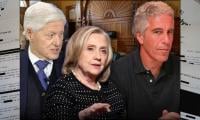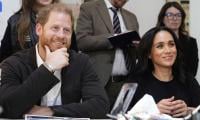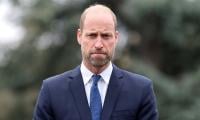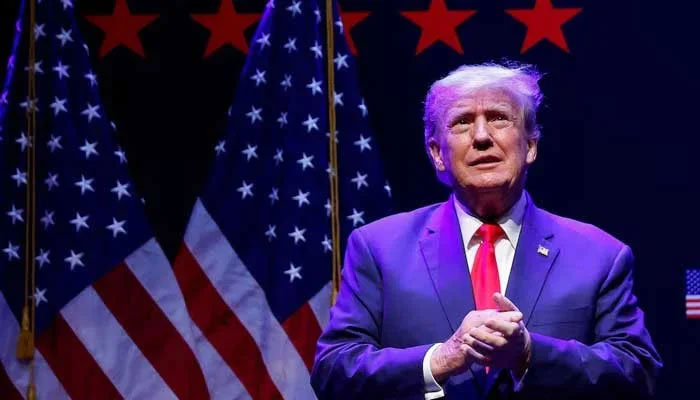Trump's presidency is different from his 44 predecessors
Richard M Nixon dismissed a prosecutor who threatened his hold on power, foreign media reported
WASHINGTON: Following his one month in office, President Donald Trump has made it clear that he sees the presidency in starkly different terms from virtually any of his 44 predecessors.
He is not the first president to push the bounds of his authority. Andrew Johnson fired a cabinet secretary in defiance of Congress. Franklin D. Roosevelt tried to pack the Supreme Court. Richard M Nixon dismissed a prosecutor who threatened his hold on power, foreign media reported.
But to a degree possibly unprecedented in the United States’ nearly 250 years, Trump is barreling through the executive branch with the conviction that it is his to rule alone, no matter the laws Congress has enacted — even if that means destroying agencies, intervening in the justice system or granting enormous authority to a wealthy donor.
That is not how most presidents have seen a job that the Constitution arguably defines — beyond its military and diplomatic duties — as essentially doing what Congress tells him, saying he must “take Care that the Laws be faithfully executed.”
“We are in a new kind of presidency with Donald Trump,” said H W Brands, a historian at the University of Texas at Austin. “He is trying to make the presidency like a CEO position in a corporation.”
Trump is the first president who is essentially ignoring the existence of Congress, added Brands, a biographer of Andrew Jackson, Franklin D. Roosevelt and Ronald Reagan. “Presidents before Trump have not led with executive orders — they have fallen back on executive orders when Congress wouldn’t do what they wanted it to do,” Brands said. “But they all agreed that it was better to get Congress to pass legislation than to issue an executive order.”
Trump’s first month is striking not just because of the president’s actions, but also because a significant number of Americans and members of Congress are applauding his aggressive approach to the job. The country appears to be in a dark mood, with some voters’ hunger for disruption outweighing their impulse to follow American traditions.
“What makes this moment particularly dangerous for those who care about our constitutional system is that Donald Trump believes he has a mandate to act this way — and so far, the American people haven’t pushed back,” said Timothy Naftali, a historian at Columbia University’s School for International and Public Affairs.
On foreign policy front, President Trump has dramatically shifted the direction of US foreign policy in four short weeks, making the US a less reliable ally and retreating from global commitments in ways that stand to fundamentally reshape America’s relationship with the world.
His top envoys have floated concessions to Russia in peace talks that stunned European allies, followed by Trump calling Ukraine’s leader a dictator, and he kept Europeans at arms length as the negotiations began. He has dismantled the leading US aid agency providing assistance to the developing world where China aims to establish a foothold. And his plans to increase tariffs heralded an end to American-fueled globalisation.
“It’s not that President Trump is abandoning the post-World War II order,” said Victoria Coates, vice president for national security and foreign policy at the Heritage Foundation, a conservative think tank. “It’s that we are no longer in the post-World War II era and we have to accept that the geopolitical landscape has shifted.”
The same approach drove Trump’s first-term foreign policy. But, in his second term, he has injected a new element, proposing to expand US borders and take territory overseas unilaterally.
Even before returning to the White House, Trump mused about reclaiming the Panama Canal, seizing Greenland from Denmark and making Canada the 51st state. When he repeated the notions after taking office, it turned what had been far-fetched ideas into possible US policy and a signal of intentions to countries worldwide.
“It will be very difficult to undo what is being done in foreign policy or to persuade allies this was a never-to-be-repeated one-off. This was possible after Trump’s election but not his re-election,” said Richard Haass, president emeritus of the Council on Foreign Relations and former senior official in Republican administrations. “America’s reputation for reliability and predictability has been seriously compromised.”
Recent events have only deepened allied suspicions about a Trump-led America.
Last week, Trump agreed to negotiations that could end Moscow’s global isolation following a call with Russian President Vladimir Putin. Defence Secretary Pete Hegseth later said peace talks to end the war in Ukraine wouldn’t see the country join the North Atlantic Treaty Organisation—a win for Moscow even before diplomacy began. Hegseth walked the comments back, insisting that all options remained on the table, but allies immediately sensed the US under Trump cared little about trans-Atlantic unity.
During a speech Friday at the Munich Security Conference, Vice President JD Vance called out European allies for what he said was a subversion of democracy—without discussing how to end the large conflict to the east. European governments asked for a seat at the Ukraine-Russia table, only to have US officials say they couldn’t attend the talks but would have their views taken into consideration.
“What’s happening is a serious challenge to the foundation of the post-World War II world order,” said Chuck Hagel, the former Republican senator turned defence secretary in the Obama administration. “I’ve never felt so concerned about the future of this country and this world as I am now.”
The yawning trans-Atlantic gap widened further this week. On Tuesday, after negotiations in Saudi Arabia between US and Russian officials ended, Trump blamed Kyiv for starting the war, though it was Russian forces that poured across the border three years ago, when Putin ordered the full-scale invasion. Trump’s remarks prompted Ukrainian President Volodymyr Zelensky to say the US president was parroting Kremlin disinformation.
Trump responded Wednesday with the harshest tirade against Ukraine by any US official since the war began, calling Zelensky a “Dictator without Elections” on social media. Zelensky’s term expired last year, but elections were postponed as Ukrainian legislation prohibits holding them while the country is under martial law.
“President Trump’s leadership has created the first opening for talks in years, and he did this after only four weeks in office,” said National Security Council spokesman Brian Hughes. “He is leaving no stone unturned as it relates to finding a peaceful resolution in Ukraine—something the previous administration abysmally flunked.”
Justin Logan, director of defence and foreign policy studies at the Cato Institute, a libertarian think tank in Washington, said it was high time an American leader acted in a way that persuaded Europeans to care more for their own region. “Trump is fulfilling an American vision that goes back to Dwight Eisenhower, who worried in 1959 that Europe’s lackadaisical attitude toward its own security was turning Uncle Sam into Uncle Sucker,” he said.
“There are howls of outrage up and down Massachusetts Avenue think tanks as consensus pieties are being uprooted and burned,” Logan continued. “If Americans are lucky, that outrage will continue.”
But America’s posture abroad had shifted even before the Ukraine dust-up.
The Trump administration in its first weeks dismantled the US Agency for International Development, freezing billions of dollars in foreign assistance for programs that treat AIDS, track pandemics and provide maternal care. Programmes from Latin America to Africa to Asia were paused, eroding years of trust built up by the US government and its partners in developing areas, aid workers say.
Secretary of State Marco Rubio, who as a US senator spent years praising USAID as a bulwark against China, is now presiding over a vastly reduced assistance programme, which Democrats and foreign-aid workers say will only benefit US adversaries investing in regions that the US abandoned. China has already told Communist leaders in Nepal that Beijing is ready to fill the funding void in the country left by USAID.
Not all of Trump’s critics say that the president is irrevocably changing US foreign policy.
John Bolton, Trump’s former national security adviser who turned against his former boss, said the president doesn’t have a coherent enough ideology to dismantle the global order. “This is one man’s view, but unfortunately he’s the president,” Bolton said. His advice to allies: “Just grit your teeth.”
-
 Jennifer Garner Drops Parenting Truth Bomb On Teens With Kylie Kelce: 'They're Amazing'
Jennifer Garner Drops Parenting Truth Bomb On Teens With Kylie Kelce: 'They're Amazing' -
 AI Is Creating More Security Problems Than It Solves, Report Warns
AI Is Creating More Security Problems Than It Solves, Report Warns -
 'Game Of Thrones' Prequel 'A Knight Of The Seven Kingdoms' New Ratings Mark Huge Milestone
'Game Of Thrones' Prequel 'A Knight Of The Seven Kingdoms' New Ratings Mark Huge Milestone -
 Apple Seeks To Dismiss Fraud Suit Over Siri AI, Epic Injunction
Apple Seeks To Dismiss Fraud Suit Over Siri AI, Epic Injunction -
 Delroy Lindo Explains The Crucial Role Of Musical Arts In Setting Up His Career Trajectory
Delroy Lindo Explains The Crucial Role Of Musical Arts In Setting Up His Career Trajectory -
 Timothée Chalamet Reveals How He Manages To Choose The Best Roles For Himself
Timothée Chalamet Reveals How He Manages To Choose The Best Roles For Himself -
 Princesses Beatrice, Eugenie’s Conflict Gets Exposed As Mom Fergie Takes Over The Media
Princesses Beatrice, Eugenie’s Conflict Gets Exposed As Mom Fergie Takes Over The Media -
 Kate Middleton Plays Rock-paper-scissors In The Rain
Kate Middleton Plays Rock-paper-scissors In The Rain -
 Lindsay Lohan On 'confusing' Teen Fame After 'Mean Girls': 'I Should Have Listened To My Mom And Dad'
Lindsay Lohan On 'confusing' Teen Fame After 'Mean Girls': 'I Should Have Listened To My Mom And Dad' -
 Savannah Guthrie Mom Update: 'Today' Show Sees Huge Ratings Boost Amid Search For Nancy Intensifies
Savannah Guthrie Mom Update: 'Today' Show Sees Huge Ratings Boost Amid Search For Nancy Intensifies -
 Hillary Clinton To Testify In Epstein Probe Alongside Bill Clinton
Hillary Clinton To Testify In Epstein Probe Alongside Bill Clinton -
 Meghan Markle, Prince Harry End Jordan Trip With Meaningful Hospital Visit
Meghan Markle, Prince Harry End Jordan Trip With Meaningful Hospital Visit -
 AI Boyfriends Gain Popularity In China As Young Women Turn To Virtual Romance
AI Boyfriends Gain Popularity In China As Young Women Turn To Virtual Romance -
 Prince William Receives Reality Check As His Media Strategy Fails
Prince William Receives Reality Check As His Media Strategy Fails -
 Zach Braff Reflects On Doing Odd Jobs Ahead Of Major Career Breakthrough In 2001's 'Scrubs'
Zach Braff Reflects On Doing Odd Jobs Ahead Of Major Career Breakthrough In 2001's 'Scrubs' -
 Google Rolls Out Nano Banana 2 With 4K AI Image Generation
Google Rolls Out Nano Banana 2 With 4K AI Image Generation




